Some days, I really do wish it was 1975 again. Life just felt easier then. I’d come home from school, drop my knapsack, and stretch out on the shag carpeting in the living room—it was warm, soft, sorta crusty from the stale pieces of cereal, and somehow the perfect place to fall asleep. Star Wars was still two years away, but the world already felt full of wonder. Did they have Abilify back then? Our family stereo was the centerpiece of the room: a pair of Celestion loudspeakers, a Thorens TD-125 turntable, and a Yamaha receiver my dad bought from Bay Bloor Radio in Toronto.

That setup was sacred. Vinyl and FM radio were all we needed. Dad never did go for a Revox reel-to-reel deck—maybe he didn’t see the point, or maybe he just knew we’d end up wrapping the furniture (or each other) in the magnetic tape. He was probably right.
Those memories have stuck with me, and maybe that’s why I’ve never stopped chasing that feeling—of music as something physical, intentional, and deeply personal. Vinyl brings that back in a way nothing else does. The only thing that comes close are the memories of my childhood friends from South Africa—epic 9-hour Star Wars battles with hundreds of action figures, followed by the delicious taste of a hot panzerotti from Bitondo’s.

Digital streaming offers instant access to millions of tracks, customizable playlists, high-resolution playback (with the right gear), and unbeatable convenience. No doubt about it. That was the most Canadian sentence ever. #nodoubt
You know what streaming will never give you? Ownership. You’re not building a collection—you’re renting access. And if TIDAL or Qobuz folds tomorrow, what then? Start from scratch on Spotify? Hand your data—and your dollars—over to Apple? If you’ve been paying for years, ask yourself: how much have you spent on music you don’t actually own?
With physical media, you own every record, every album, every piece of your collection. It’s not just about listening; it’s about preserving something tangible, something real. Every album is a piece of history you can touch, display, and hold—something that streaming will never give you.

But as any collector knows, once you start gathering records, you need a proper place to store them. Whether you’re just starting out or finally upgrading from milk crates and stacked shelves, finding the right vinyl storage system is key—not just for organization, but for preserving your collection and making it part of your space.
So if you’re looking to bring a little of that ’70s soul into your home—without spending a fortune—here are some of the best vinyl storage systems under $500 in 2025.
For those with much deeper pockets, it’s impossible to not endorse Atocha Design which is based in New York City. Great person. The best quality bar none.
The best vinyl record storage systems under $500 in 2025 combine style, durability, and functionality. Top picks include modular units like the IKEA Kallax, audiophile favorites like the Line Phono Turntable Station, and handcrafted options from Symbol Audio.
These storage solutions hold between 50 and 500+ records, offer turntable integration, and suit a variety of aesthetics—from mid-century modern to minimalist. Ideal for collectors who want to protect their LPs while showcasing them, these storage systems balance form and function without breaking the bank.
How to Choose the Right Vinyl Storage System
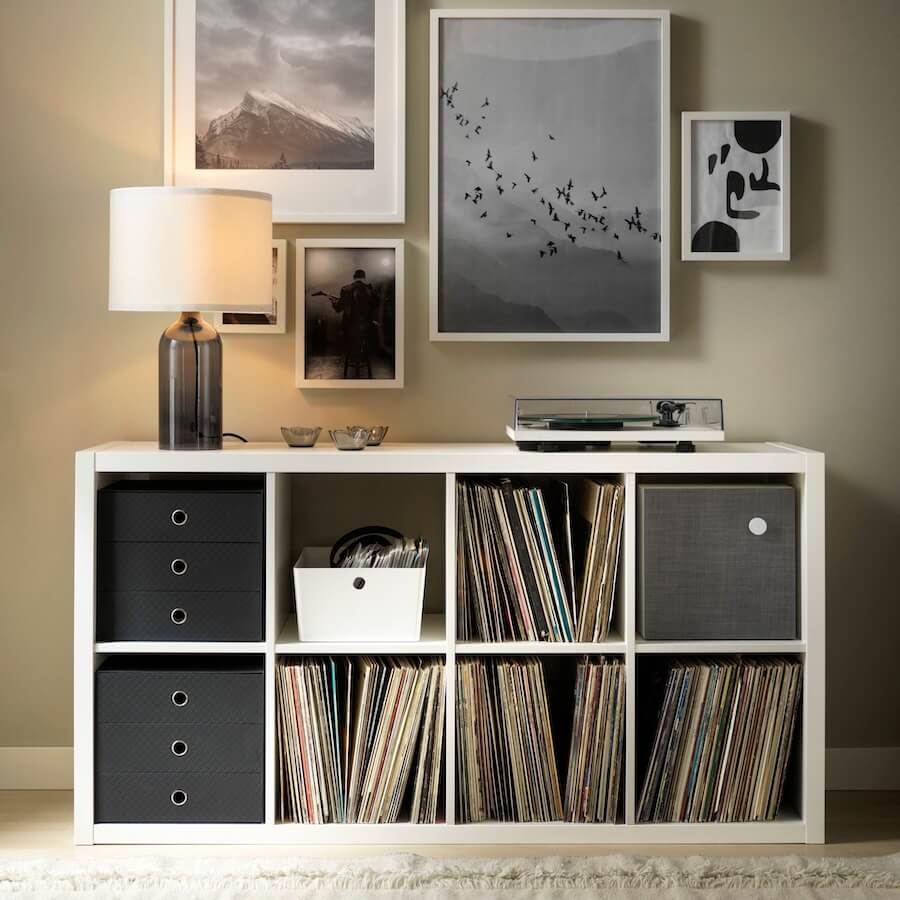
Capacity Matters
Estimate your current collection and leave room to grow. LPs take up about 12” vertically, and roughly 70–80 LPs can fit per linear foot. And hey, don’t feel guilty about all those Herb Alpert records you scored at garage sales. Lousy music needs a home like anything else.
Material & Durability
Heavy-duty MDF, solid wood, or reinforced metal frames hold up best. Avoid cheap particleboard that can sag over time. Another important thing to remember is that record weight can cause a storage system to topple over if it’s not properly anchored to the wall.
Do you know all those warnings about making sure your large TV is properly mounted to the wall or secured to your media unit so it doesn’t fall over and harm your kids or pets? The same rule applies to your record collection. Anchors exist for a reason—even the not-so-great ones IKEA provides. Don’t make Börje Lindgren take a sick day to attend your funeral.
Accessibility & Design
Front-facing crates are great for flipping through albums, while cube-style shelves help organize large collections. Consider if you want to store gear, too (amp, turntable, etc.).
Expandability
If you’re still building your collection, opt for modular systems you can add onto later. If you choose something like the IKEA Kallax, play it safe by placing each unit horizontally on the floor instead of stacking them. Floor-to-ceiling vinyl might look cool, but we’d recommend a custom built-in unit for that look.
Style & Room Fit
Mid-century modern and minimalist designs continue to trend in 2025. Match your setup with your room’s vibe.
Top Vinyl Storage Picks for 2025 (All Under $500)
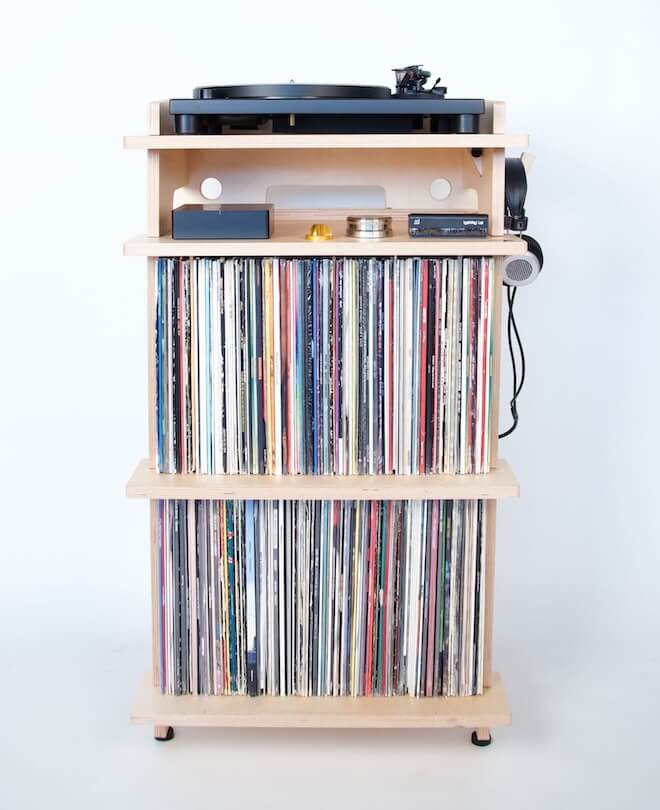
Line Phono Turntable Station – $329
- Capacity: ~200 LPs + gear space
- Style: Industrial-modern, matte black or birch finish
- Why Buy: Built by audiophiles with ideal turntable height and gear shelving
- 2025 Update: Now features improved vibration-dampening legs and smoother finish options
Where to buy: $329 at Turntable Lab
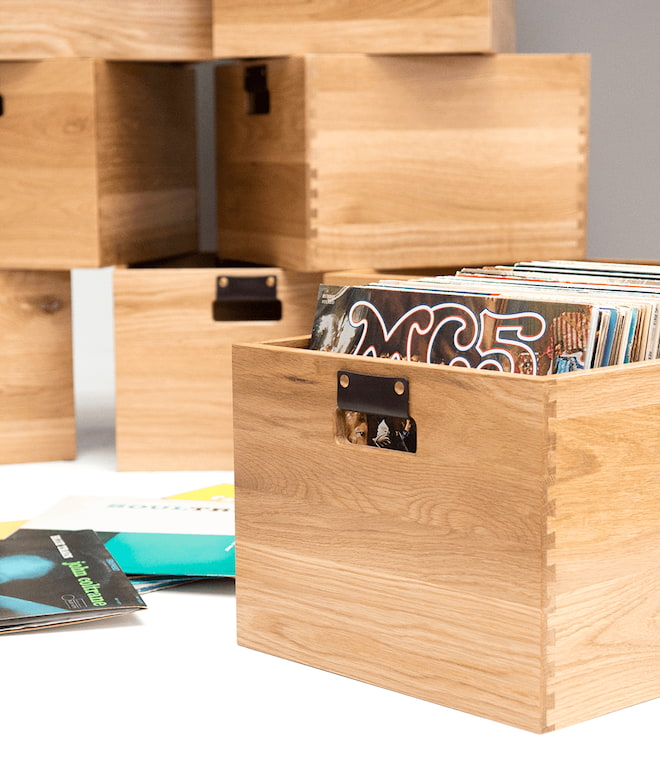
Symbol Audio Dovetail Record Crate – $285
- Capacity: ~75 LPs
- Style: Vintage-modern, walnut or oak options
- Why Buy: Handmade in the U.S. with premium hardwood and joinery
- 2025 Update: Leather handles and brass hardware
Where to buy: $285 at Symbol Audio
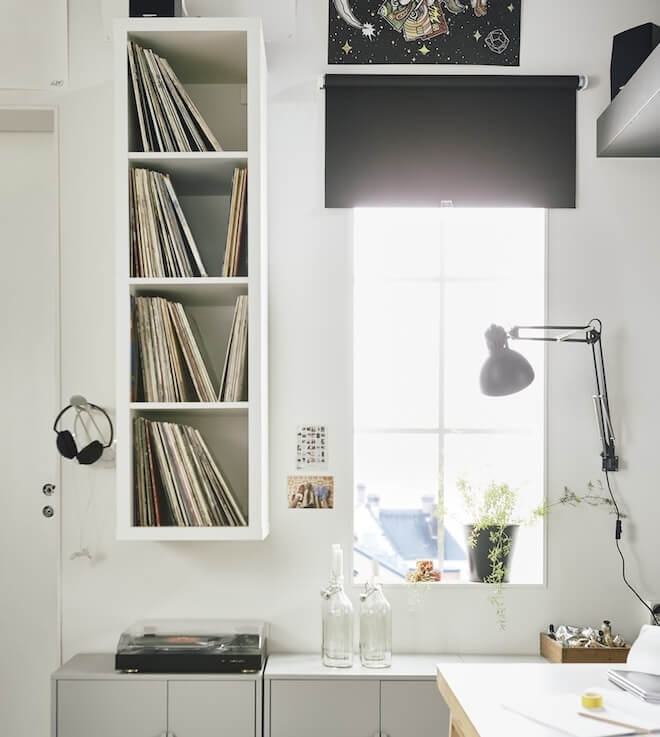
IKEA Kallax – $25-$325
- Capacity: 100–500+ LPs depending on size
- Style: Minimalist, tons of color options
- Why Buy: Still the go-to budget favorite, but now with 2025 add-ons like felt dividers and vibration-dampening feet
- Pro Tip: Reinforce large units to prevent sagging—aftermarket LP divider systems help keep albums upright. Design your own Kallax shelving system.
Where to buy: $24.99 – $329.99 at IKEA
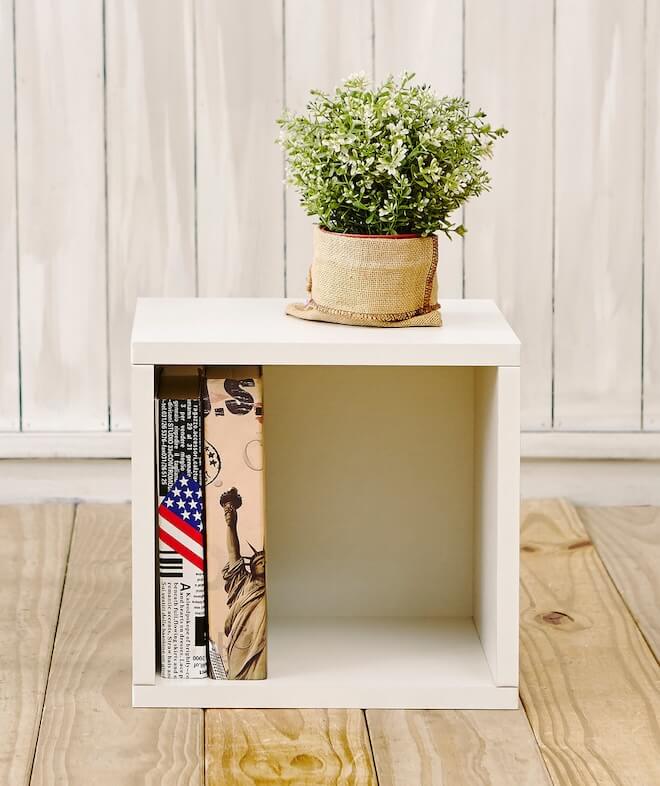
Way Basics Dylan Vinyl Record Storage Cube System – $41
- Capacity: ~70 LPs per cube
- Style: Lightweight, eco-friendly
- Why Buy: Inexpensive, stackable, and made from sustainable zBoard material
- 2025 Update: New colors, magnetic connectors for safer stacking
- Pro Tip: Do not stack more than 2 and secure to wall if possible
Where to buy: $40.99 at Way Basics (per cube)
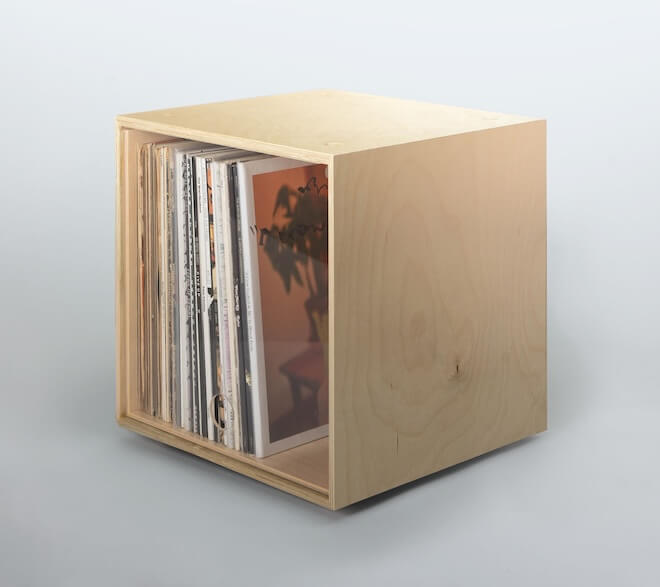
Simple Wood Goods Storage Cube – $189
- Capacity: 70 LPs per cube
- Style: Made in America from Baltic birch plywood and include a swing down door
- Why Buy: Storage components interlock securely, allowing users to customize and expand their storage setup as their collection grows. Each unit features a door that pivots and slides into the top of the cube, ensuring a sleek appearance whether open or closed.
- 2025 Update: More finishes including Walnut and Birch
- Pro Tip: Optional divots on the top of the cube and feet on the bottom interlock to create a stable unit.
Where to buy: $189 at Simple Wood Goods (per cube)
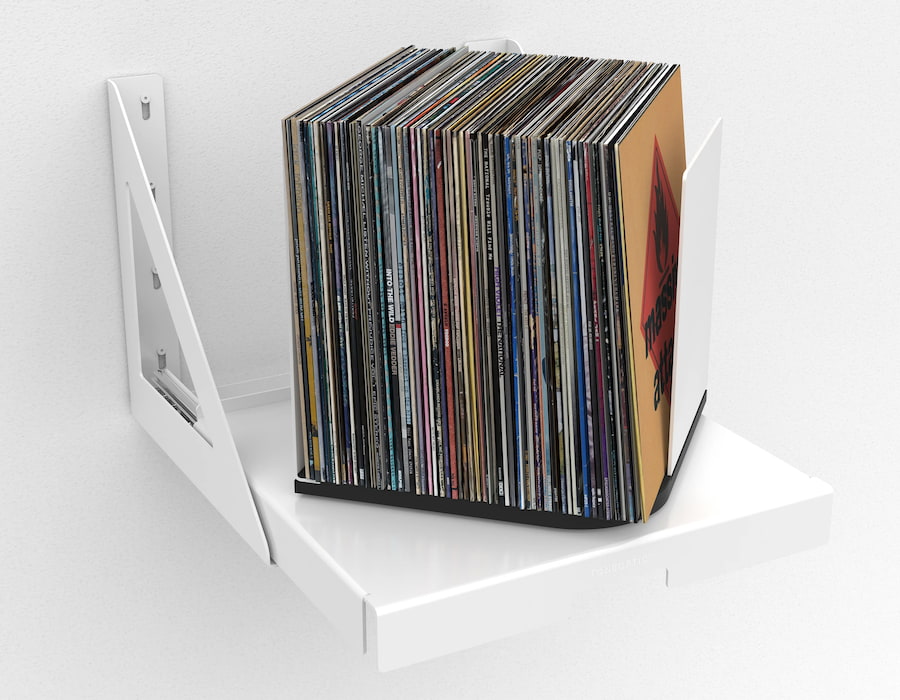
Toneoptic rpm – Starting at $325 per unit
- Capacity: Each rpm unit holds up to 75 regular-sized 12″ or 10″ records, though a more realistic number is 55 to 60 when accounting for modern reissues with thicker jackets.
- Style: Precision-built using aluminum, steel, and wood accents, offering a blend of modern design and robust durability.
- Why Buy: The Toneoptic rpm is a premium, audiophile-grade record storage and display system designed to elegantly store and showcase vinyl records. It stands out for its rotating, wall-mounted design, allowing users to flip through records easily while also turning their vinyl collection into a visual centerpiece. Can be used 3 ways which adds to its versatility.
- 2025 Update: Wall-mount, table-mount and even install inside an existing wall unit
- Pro Tip: Choose a bottom-mount unit if you have a platform to securely mount it to that can withstand the ~80 pounds of weight easily and safely.
Where to buy: $325 at Toneoptic
Vinyl Storage Tips?
These should be common sense by now, but they’re always worth keeping in mind to ensure your collection stays organized and in great shape for the next 50 years.
- Keep It Vertical: Avoid stacking records flat—they’ll warp.
- Climate Control: Store in a cool, dry room. Avoid direct sunlight or near heaters.
- Dividers Help: Prevent leaning with wooden or felt record dividers.
- Think Long-Term: Buy with growth in mind—you’ll collect more than you expect!
The Bottom Line
With more people rediscovering vinyl in 2025, the storage market has leveled up. You don’t need to spend thousands to get a great-looking and functional system—just match your space, collection size, and style. A few last things to consider include adding LP dividers and some shelf lighting so that you can find that specific album more easily.
In the end, there’s something deeply comforting about vinyl storage, Star Wars, and shag carpeting. These relics of a simpler time remind us of a world where physical music ownership mattered—where your record collection was a reflection of your personality, your tastes, and your life story.
It was a time when relationships weren’t built through anonymous likes or algorithm-driven feeds, but through real, face-to-face connections on playgrounds and at local record shops. Sure, things are different now, and maybe we’ve traded in our vinyl crates for digital playlists and our shag carpets for sleek hardwood floors. But it’s okay to embrace that nostalgia—after all, it represents a time when life felt tangible, music felt personal, and friendships were formed in ways that felt a lot less disposable.
It’s a reminder that sometimes the best things in life are the ones that come with a little history attached. Like Han and Leia, who found something real amidst the chaos of a galaxy far, far away, we too can find value in the authenticity of physical music and the memories tied to it.
Related Reading:





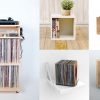





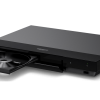
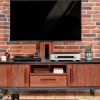












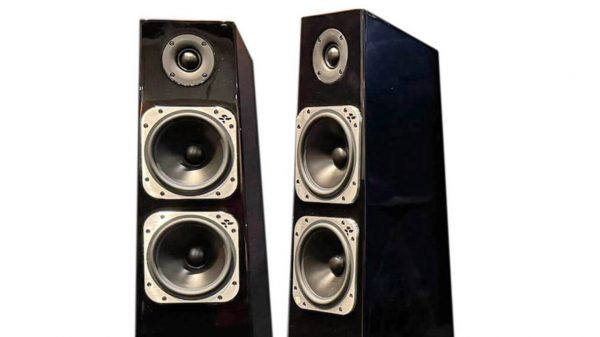
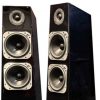

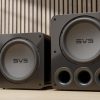
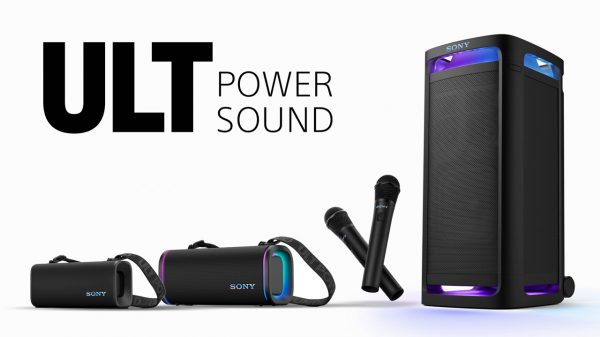



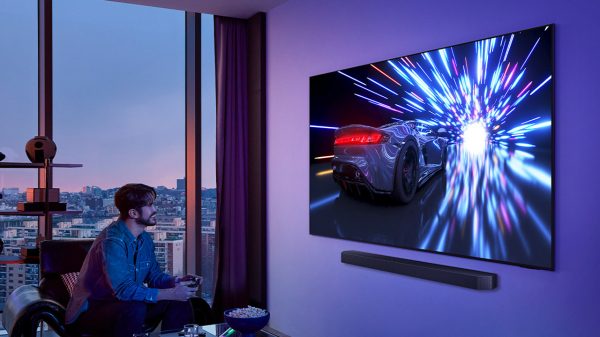












Anton
April 13, 2025 at 5:28 pm
Good to see you back on your feet and clearly improving. Really solid article with some snark.
The last option is very appealing — but only if you don’t have a huge vinyl record collection. 10 units for 750 records would cost — $3,250 USD.
Not inexpensive.
The Symbol Audio furniture seems very overpriced. It looks good but you could purchase a system at those prices.
The option with the doors is kinda intriguing.
Ian White
April 13, 2025 at 5:33 pm
Anton,
Just getting started. Have 5 more features coming this week. Inpatient is almost done. My new “reality” will be a transition. Feels good to be focused again and not filled with mania.
Back to the article…the last option is very cool and I like how it operates. It is expensive.
I did some freelance marketing work for Symbol like 15 years ago so I’m not going to disparage their products. They make very good products. Not inexpensive but the construction quality is excellent. It’s mid-century stuff that appeals to a very specific type of buyer.
The Simple Woods stuff is really solid. You can mount them and create an entire wall. They also make base units to make it a Hi-Fi stand as well. Will likely be what I order next.
IW
Anton Birch
April 13, 2025 at 8:38 pm
Their “record console” is appalling overpriced. The storage cubes look good but that other option with the swing down door looks better, IMHO.
I like they they offer the option of feet so that they can be stacked and not scuff the other.
Their equipment rack looks good but they need a larger range of finishes. Too basic.
Did Eric Pye do a RSD piece? I enjoy his work.